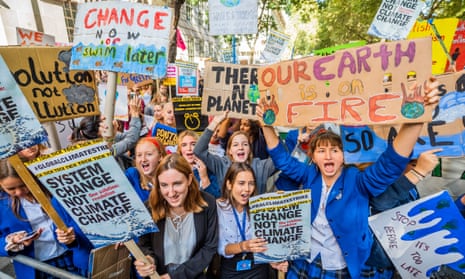Labour, the Scottish National party and the Liberal Democrats have backed calls for a televised climate debate between party leaders ahead of the election, warning that time is running out to tackle the global heating emergency.
School strikers, students and pensioners’ groups launched a campaign at the weekend to try to force political leaders to discuss the climate crisis live on television ahead of the December poll.
On Monday, Jeremy Corbyn supported the proposal, saying the upcoming election was the “last chance to radically change course, or face the threat of a hostile and dying planet”.
“We don’t have time to waste,” the Labour leader told the Guardian. “A leaders’ debate on the climate and environment emergency is essential.”
Ed Davey, the deputy leader of the Liberal Democrats, backed the initiative, saying it was a “no brainer”. The Green party also supported the plan. The Conservative party had not responded to requests for comment at the time of publication.
The climate emergency has been forced up the political agenda in the past year as evidence of the crisis – from floods to wildfires, record temperatures to melting ice – has become impossible to ignore.
In the UK, hundreds of thousands of schoolchildren have taken to the streets to demand action and Extinction Rebellion protests have brought large parts of London to a standstill.
In the spring, parliament declared a climate emergency, but experts warn that although the language used to describe the crisis has changed, there has been no meaningful change in policy.
The campaign for a climate debate was launched by the National Union of Students and National Pensioners Convention as part of a coalition of groups representing students, pensioners, trade unions, business and charities. An online petition was launched on Monday, calling on members of the public to back the plan.
Joe Brindle, 17, a campaigner with the UK Student Climate Network, said: “We need to know what a potential prime minister will do to tackle the climate emergency. It’s essential that we have a climate and nature debate to inform the electorate and centre the issue at the heart of the election.”
Labour has said it is putting the climate crisis at the heart of its election campaign under its green industrial revolution agenda. It has announced a raft of policies that it said would transform the economy with the ambition of becoming zero carbon by 2030, creating hundreds of thousands of jobs, transforming the housing stock and cracking down on the major polluters.
Corbyn said: “Labour’s ‘green new deal’ will have the most ambitious climate targets of any country in the world and will invest on a massive scale, [transforming] towns, cities and communities that have been held back for too long.”
For the Liberal Democrats, Davey said: “With the climate crisis already doing irreversible damage to our planet, it is a no brainer that candidates for prime minister debate their plans to tackle climate change.”
The SNP’s Westminster leader, Ian Blackford, said the youth climate strikers had made “a huge and tangible impact on our political sphere”. He added: “The SNP strongly supports the proposal for climate change debates and will work with the youth climate strikers to ensure the climate crisis is at the forefront of the upcoming general election.”
The call for a leaders’ debate came as more than 30 environmental charities and NGOs representing 13 million people called on political parties to put the environment at the centre of their manifestos.
Max Wakefield, a director at the climate charity Possible, which is leading the campaign for the debate, said the past year “of extraordinary social movements and political protest” had created “a new climate moment”.
“Now we need a new climate mandate. The world’s first election climate and nature debate would help to deliver one, and shine a light on just how closely this emergency affects vital issues such as housing, health and security. Simply put, this must be our first climate election.”
John Sauven, the executive director of Greenpeace UK, which was one of the signatories, said: “Our environment is drifting into uncharted and dangerous waters. Instead of bobbing about on a wave of inaction, it’s time for politicians across all political parties to take the helm.”
Boris Johnson and Jeremy Corbyn will take part in the first head-to-head debate of the election campaign on 19 November. It will be followed later on the same evening by a live interview-based programme in which other parties will have the opportunity to comment on the debate and set out their own policy agenda.
